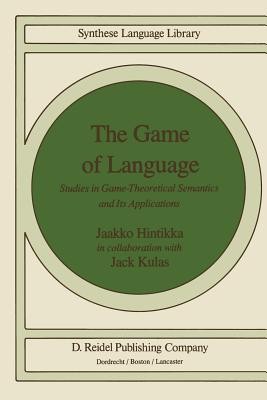
- We will send in 10–14 business days.
- Author: Jaakko Hintikka
- Publisher: Springer
- Year: 1985
- Pages: 356
- ISBN-10: 9027719500
- ISBN-13: 9789027719508
- Format: 15.6 x 23.4 x 1.9 cm, minkšti viršeliai
- Language: English
- SAVE -10% with code: EXTRA
Reviews
Description
Since the first chapter of this book presents an intro- duction to the present state of game-theoretical semantics (GTS), there is no point in giving a briefer survey here. Instead, it may be helpful to indicate what this volume attempts to do. The first chapter gives a short intro- duction to GTS and a survey of what is has accomplished. Chapter 2 puts the enterprise of GTS into new philo- sophical perspective by relating its basic ideas to Kant's phi losophy of mathematics, space, and time. Chapters 3-6 are samples of GTS's accomplishments in understanding different kinds of semantical phenomena, mostly in natural languages. Beyond presenting results, some of these chapters also have other aims. Chapter 3 relates GTS to an interesting line of logical and foundational studies - the so-called functional interpretations - while chapter 4 leads to certain important methodological theses. Chapter 7 marks an application of GTS in a more philo- sophical direction by criticizing the Frege-Russell thesis that words like is are multiply ambiguous. This leads in turn to a criticism of recent logical languages (logical notation), which since Frege have been based on the ambi- guity thesis, and also to certain methodological sug- gestions. In chapter 8, GTS is shown to have important implications for our understanding of Aristotle's doctrine of categories, while chapter 9 continues my earlier criticism of Chomsky's generative approach to linguistic theorizing.
EXTRA 10 % discount with code: EXTRA
The promotion ends in 21d.20:59:38
The discount code is valid when purchasing from 10 €. Discounts do not stack.
- Author: Jaakko Hintikka
- Publisher: Springer
- Year: 1985
- Pages: 356
- ISBN-10: 9027719500
- ISBN-13: 9789027719508
- Format: 15.6 x 23.4 x 1.9 cm, minkšti viršeliai
- Language: English English
Since the first chapter of this book presents an intro- duction to the present state of game-theoretical semantics (GTS), there is no point in giving a briefer survey here. Instead, it may be helpful to indicate what this volume attempts to do. The first chapter gives a short intro- duction to GTS and a survey of what is has accomplished. Chapter 2 puts the enterprise of GTS into new philo- sophical perspective by relating its basic ideas to Kant's phi losophy of mathematics, space, and time. Chapters 3-6 are samples of GTS's accomplishments in understanding different kinds of semantical phenomena, mostly in natural languages. Beyond presenting results, some of these chapters also have other aims. Chapter 3 relates GTS to an interesting line of logical and foundational studies - the so-called functional interpretations - while chapter 4 leads to certain important methodological theses. Chapter 7 marks an application of GTS in a more philo- sophical direction by criticizing the Frege-Russell thesis that words like is are multiply ambiguous. This leads in turn to a criticism of recent logical languages (logical notation), which since Frege have been based on the ambi- guity thesis, and also to certain methodological sug- gestions. In chapter 8, GTS is shown to have important implications for our understanding of Aristotle's doctrine of categories, while chapter 9 continues my earlier criticism of Chomsky's generative approach to linguistic theorizing.


Reviews